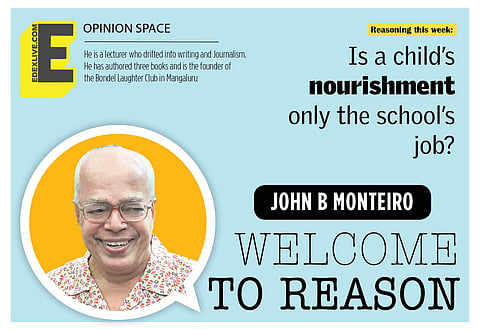

Orandum est ut sit mens sana in corpore sano (You should pray for a healthy mind in a healthy body)
- Juvenal, Roman poet at the end of first century CE
A healthy mind in a healthy body is the focus of an interesting theme of a report titled ‘Children’s learning depends on mid-day meals, finds study’ by Pearl Maria D’Souza in The New Indian Express (26/3/21) and excerpted here:
For many families, the mid-day meal is very important as parents can provide only one meal to their children, a new study has found. Over half the parents surveyed concurred with this, reiterating the relevance of the Bisi Oota (hot meal) scheme for a large number of children who face food insecurity and for those who suffer from mild to moderate malnutrition.
Commissioned in 2016-17, the study by the Karnataka Evaluation Authority (KEA) was released in January 2021. It found that 2,14,500 children do not get breakfast at home. “This comprises 5.1% of the total children in government schools. In all, 52% of parents treat mid-day meals as a substantive meal as they can provide only one meal at home (5.1%),” the study stated. These findings assume more significance given that the mid-day meal scheme has been suspended since the COVID-19-related lockdown was imposed and, for the past few months, has been replaced with a supply of dry ration to children.
Researchers from the Hyderabad Karnataka Centre for Advanced Learning, Kalaburagi, who did the study for KEA, also referred to the scheme’s role in reducing anaemia in children. There are 55 lakh children under the mid-day meal scheme. Milk at school is the first food for these students, the study said, pointing out that students valued milk more than meals for contribution to studies. “The study finds that the impact of milk is wholesome, very deep and intense. It is perceptible on enrolments at the secondary stage of schooling, as well as on retention and transition at lower primary school/higher primary school stages,” the researchers said.
One thing that stands out in this report is that the nourishment the poor children receive is linked to schools and is restricted to those who attend school. What happens to those undernourished children who are not in a position to attend school and have to add to the income of the families by doing odd jobs? For such children, Juvenal’s exhortation about a healthy mind in a healthy body sounds hollow and holds no potential. Is feeding underprivileged children independent of class-rooms a feasible option?
